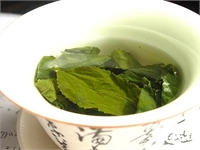
Health Benefits of Green Tea
Important Notice: Our web hosting provider recently started charging us for additional visits, which was unexpected. In response, we're seeking donations. Depending on the situation, we may explore different monetization options for our Community and Expert Contributors. It's crucial to provide more returns for their expertise and offer more Expert Validated Answers or AI Validated Answers. Learn more about our hosting issue here.

Health Benefits of Green Tea
You must be logged in to post a comment.
Statistically speaking, more people throughout the world drink tea than any other beverage except water.
And while a number of health benefits have been attributed to black, white, and oolong tea, studies show a much lower rate of cancer in regions of the world where green tea is consumed regularly. In fact, in 1994 the Journal of the National Cancer Institute published the results of a study indicating that drinking green tea reduced the risk of esophageal cancer in Chinese men and women by nearly sixty percent. And the Japanese, who drink green tea almost exclusively, have the lowest rate of heart disease of all the industrialized nations, as well as living the longest. But that’s really just the beginning of health benefits of green tea!
Researchers at University of Purdue recently concluded studies showing that drinking green tea lowers total cholesterol levels, while improving the ratio of good (HDL) cholesterol to bad (LDL) cholesterol. Additionally, people who drink four to six cups of green tea a day have a much lower incidence of liver, pancreatic, breast, lung, esophageal, and skin cancers than people who drink less green tea or none at all. (Yes, ladies, Japanese women have half the incidence of breast cancer as American women.) And green tea inhibits blood "clumping," a major contributor to many heart attacks.
And that’s not all green tea can do!
> Green tea reduces high blood pressure, another factor in heart disease.
> Green tea helps maintain blood-sugar levels by restricting caloric levels–which makes it valuable when trying to control weight. And since studies show that animals that maintain moderate blood-sugar levels live longer, green tea just makes good sense.
> Green tea burns fat, preventing diabetes and stroke.
> Green tea staves off dementia.
> Green tea keeps influenza in check. In fact, green tea and its active constituents are regularly prescribed in the East to treat colds and flu.
> Green tea inhibits growth of bacteria that causes halitosis (bad breath) and is also thought to prevent gum disease, cavities, and acne. (The Japanese traditionally drink green tea after each meal to make the mouth feel clean and refreshed–and not be offensive.)
> Green tea has important antioxidants (called catechins) and compounds that help in maintaining good health by scavenging for free radicals in the blood that can damage DNA and contribute to cancer, blood clots, and atherosclerosis.
And the health benefits of green tea don’t stop there!
> Because of green tea‘s minimal processing — its leaves are withered and steamed, not fermented like black and oolong teas — green tea’s unique catechins, especially epigallocatechin-3-gallate (EGCG), are more concentrated.
> A study conducted in Japan that involved nearly 500 Japanese women with Stage I and Stage II breast cancer, found that increased green tea consumption before and after surgery was associated with lower recurrence of the cancers.
> Studies in China have shown that the more green tea participants drank, the less the risk of developing stomach cancer, esophageal cancer, prostate cancer, pancreatic cancer, and colorectal cancer.
> Recent studies have found a link between high green tea consumption and reduced risk of lung cancer.
> A study involving 500 Japanese men and women found that drinking at least four cups of green tea every day may be related to the reduced severity of coronary heart disease among the male participants.
The scientific study of green tea is one of the most active and promising fields of research on the planet today. All around the world, researchers are discovering new uses and health benefits of green tea proving that not only is it one of the healthiest natural substances we can consume, numerous ailments could most likely be prevented entirely when consumed regularly.